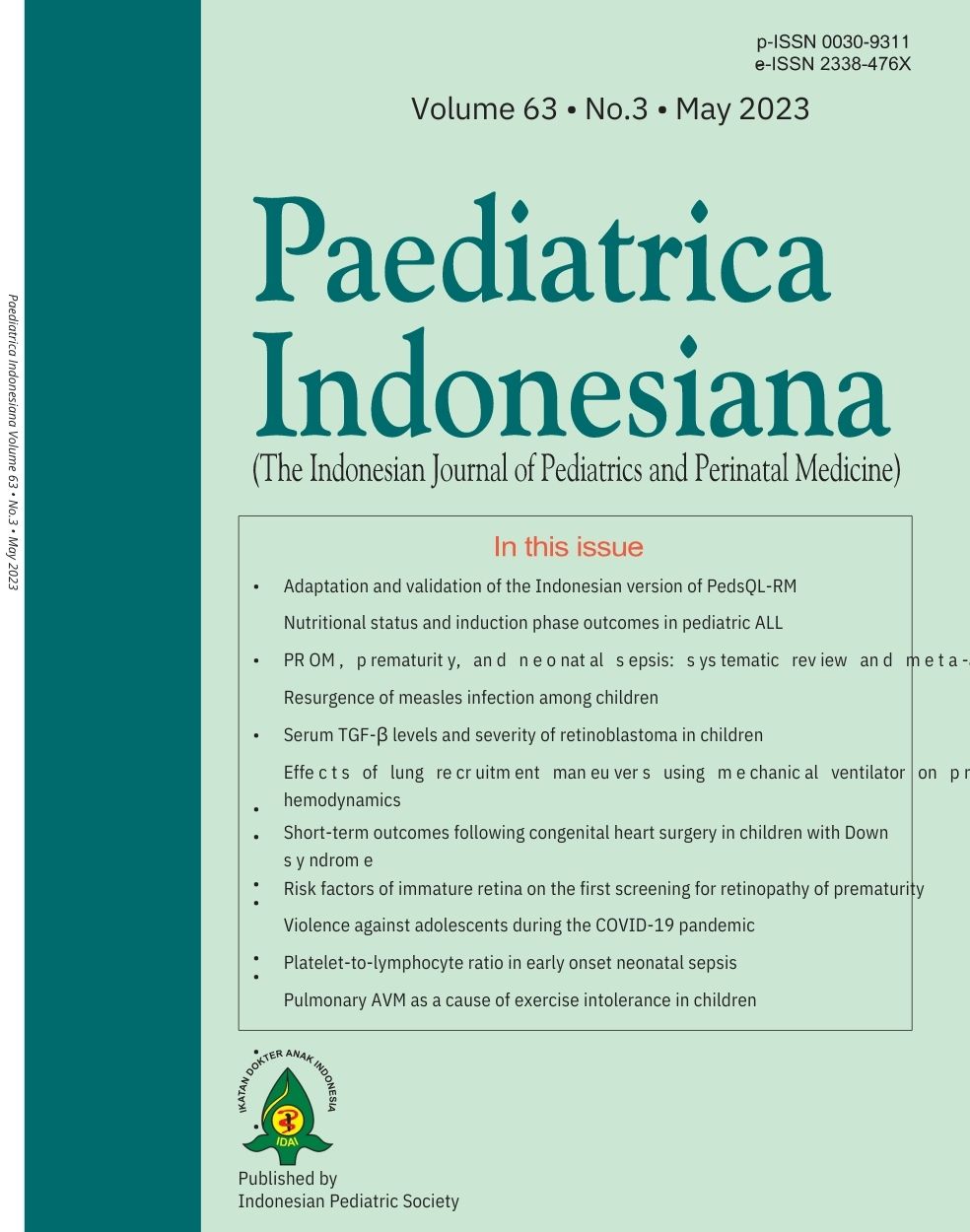Violence against adolescents during the COVID-19 pandemic in Bandung, Indonesia
Abstract
Background Violence against children includes all forms of violence against people under 18 years old, whether perpetrated by parents or other caregivers, peers, romantic partners, or strangers. During the COVID-19 pandemic, strained parent-child relationships due to family financial pressure, physical or mental health problems, and lockdown conditions that kept families at home and in close proximity for long periods of time might have exacerbated any underlying tensions.
Objective To describe violence against adolescents in Bandung during the COVID-19 pandemic, in the form of psychological violence, physical violence, neglect, and sexual abuse.
Methods This descriptive study was held from October to December 2020. Subjects were adolescents aged 12-18 years attending junior and senior high school in Bandung. Subjects filled the International Society for Prevention of Child Abuse and Neglect (ISPCAN) Child Abuse Screening Tool-for Children (ICAST-C) questionnaire (Indonesian version).
Results The most common forms of violence experienced by adolescents in Bandung during the COVID-19 pandemic were being ignored (psychological violence), startled aggressively (physical violence), and being made to feel unimportant (neglect). Sexual abuse was reported by a minority of subjects.
Conclusion The predominant type of violence against adolescents in Bandung during the COVID-19 pandemic was psychological violence, followed by physical violence and neglect.
References
2. Runyan DK, May-Chahal C, Ikeda R, Hassan F, Ramiro L. Child abuse and neglect by parents and other caregivers. In: World Report on Violence Health. Geneva: World Health Organization; 2002. p. 59–86.
3. Presiden Republik Indonesia. Undang-Undang Republik Indonesia Nomor 23 Tahun 2002 tentang Perlindungan Anak. Jakarta: Kementrian Hukum dan Hak Asasi Manusia RI; 2002 p. 1–5.
4. Perry C. Silver linings: positive effects of the COVID-19 pandemic on children [Internet]. Parents.com. 2021; [cited 29 January 2022]. Available from: https://www.parents.com/kids/health/childrens-mental-health/silver-linings-positive-effects-of-the-covid-19-pandemic-on-children/.
5. Hutabarat JS, Krismonika G, Lofa E. Perempuan di tengah konflik dan upaya membangun perdamaian yang berkelanjutan di masa pandemi Covid-19. J Kaji Lemhannas RI. 2022;8:122-31.
6. Maknun L. Kekerasan terhadap anak yang dilakukan oleh orang tua (child abuse). Muallimuna. 2017;3:66–77.
7. Wahyuni D. Pencegahan kekerasan terhadap anak pada masa pandemi Covid-19. Jakarta: Pusat Penelitian Badan Keahlian DPR RI; 2009. p.13-8. ISSN 2088-2351.
8. Komisi Perlindungan Anak Indonesia (KPAI). Hasil survey pemenuhan hak dan perlindungan anak pada masa pandemi COVID-19. [cited 2021 December 27] Available from: https://bankdata.kpai.go.id/files/2021/02/Hasil-Survei-KPAI-2020-Pemenuhan-dan-Perlidunga-di-Masa-Covid-19.pdf.
9. Runyan D, Brandspigel S, Zolotor A, Dunne M. Manual for administration: The ISPCAN child abuse screening tool (ICAST). International Society for the Prevention of Child Abuse and Neglect (ISPCAN). Denver: ISPCAN; 2015.
10. Dhamayanti M, Rachmawati A, Noviandhari A. Validity and reliability update of the Indonesian version of International Society for Prevention of Child Abuse and Neglect - Child Abuse Screening Tool (ICAST-C). Paediatr Indones. 2020;60:218-23. DOI: 10.14238/pi60.4.2020
11. Syukriani Y, Noviandhari A, Arisanti NSetiawati EP, Rusmil VK, Dhamayanti M, et al. Cross-sectional survey of underreported violence experienced by adolescents: a study from Indonesia. BMC Public Health. 2022;22:50. DOI: https://doi.org/10.1186/s12889-021-12427-8.
12. Klein S, Merritt DH. Neighborhood racial & ethnic diversity as a predictor of child welfare system involvement. Children Youth Services Rev. 2014;41:95–105. DOI: https://doi.org/10.1016/j.childyouth.2014.03.009.
13. Latifah MM, Yulia R, Arinda YD, Pratomo H. Kekerasan dalam keluarga pada remaja di masa pandemi Coronavirus Disease 2019 (Covid-19). NersMid J Keperawatan Kebidanan. 2021;4:100–12.
14. Patrick SW, Henkhaus LE, Zickafoose JS, Lovell K, HalvorsonA, Loch S, et al. Well-being of parents and children during the COVID-19 pandemic: a national survey. Pediatrics. 2020;146:e2020016824. DOI: https://doi.org/10.1542/peds.2020-016824.
15. Patwardhan I, Hurley KD, Thompson RW, Mason WA, Ringle JL. Child maltreatment as a function of cumulative family risk: findings from the intensive family preservation program. Child Abuse Negl. 2017;70:92-9. DOI: https://doi.org/10.1016/j.chiabu.2017.06.010.
16. Murray LK, Nguyen A, Cohen JA. Child sexual abuse. Child Adolesc Psychiatr Clin N Am. 2014;23:321-37. DOI: https://doi.org/10.1016/j.chc.2014.01.003.
17. Risma D, Solfiah Y, Satria D. Hubungan tingkat pendidikan orang tua dengan bentuk kekerasan terhadap anak. J Educhild. 2018;7:113–7.
18. Arinalhaq R, Hadiyanto. Peran keluarga, sekolah dan masyarakat dalam penanganan kekerasan terhadap anak (child abuse) pada masa pandemi COVID-19. E-tech. 2020;8.
Copyright (c) 2023 Nita Arisanti, Putri Sartika Dewi, Nia Kania, Meita Dhamayanti

This work is licensed under a Creative Commons Attribution-NonCommercial-ShareAlike 4.0 International License.
Authors who publish with this journal agree to the following terms:
Authors retain copyright and grant the journal right of first publication with the work simultaneously licensed under a Creative Commons Attribution License that allows others to share the work with an acknowledgement of the work's authorship and initial publication in this journal.
Authors are able to enter into separate, additional contractual arrangements for the non-exclusive distribution of the journal's published version of the work (e.g., post it to an institutional repository or publish it in a book), with an acknowledgement of its initial publication in this journal.

This work is licensed under a Creative Commons Attribution-NonCommercial-ShareAlike 4.0 International License.
Accepted 2023-07-03
Published 2023-07-03











